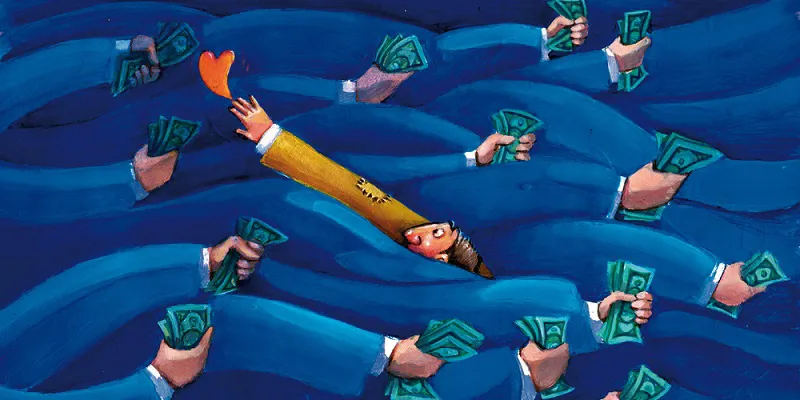My dear fellow and aspiring entrepreneurs,
The ongoing state of valuations, apparent drying-up of VC funds, and the rising murmurs of the startup bubble bursting are enough to put one through the five stages of grief. We are entering a new phase of startups in India – a ‘self-realisation’ phase that was preceded by ‘doubt’, ‘exuberance’ and ‘vanity’.

Image : shutterstock
Let me clarify.
The Indian startup ecosystem is as early stage as a startup itself. It took us over 60 years after independence to dream of creating a company that could have a presence all over India (kudos to the Bansals!) and beyond India (kudos to Deepinder Goyal!). The entrepreneurial spirit has always existed, but only recently that it really started picking up. Between 2007 to 2010, few believed that companies like these could be created in India and while they were generating good traction, they rarely made it to the boardroom discussion of most VCs. I label this phase as doubt. Luckily, FlipKart and Zomato survived; otherwise many potential unicorns would have died an untimely death.
Cut to circa 2011 – 2013 or the period of exuberance. A recovering economy led to rising valuations. FlipKart and Zomato valuations rose manifold (primarily on account of existing opportunity) and players like Snapdeal, Ola and Paytm joined the party, raising millions and becoming unicorns in a short period of time. This led to our next phase, vanity – or “Mirror, mirror on the wall.” The startup ecosystem was being pumped with money; self-proclaimed startup specialists mushroomed; and many startups were funded due to the perceived huge opportunity in a particular sector – think online real estate, food tech and everything hyper-local.
(No offense to entrepreneurs from any of these companies, but I think it was access to easy capital that created troubles for you and even though I don’t know you, I respect you for what you tried to do)
An ideal startup ecosystem is usually a combination of a seemingly delusional entrepreneur, pragmatic investors and historically-not-so-well-served consumers. During the vanity phase, everything moved fast. Money was raised quickly often for an idea, often without a proper execution plan in place. This was detrimental to an entrepreneur; before falling in love with their idea or vision, they fell in love with money and business. They didn’t have to go through the hardships like Flipkart, Ola etc, to prove their business model or go out in the market and create a name for themselves. The ideal mix was missing.
But vanity comes before a fall. Soon these startups were shutting shop (it is not hard to guess why) in what seemed like a domino effect, and then came the dawn of self-realisation. Market corrections in the Indian financial markets ensured that the vanity phase evaporated almost overnight!
What does the phase of self-realisation entail for the Indian startup ecosystem?
- a) Investors are taking stock of prior investments, trying to recuperate as much as they can by supporting their existing white horses, and are extremely wary of taking on any new bets.
- b) With the dressing down, the entrepreneurial class has thinned down and the good news is that now you can see them appearing delusional again.
- c) Consumers are and will always be hungry for good product/services.
We are now left with limited resources and abundant opportunity. My fellow entrepreneurs: this period requires us to follow a different approach; we have to move on from staying hungry and foolish, to staying poor and optimistic.
The media will bombard us day after day with news of lower valuations and companies shutting down. They may be right or wrong, but let’s just keep our heads down and try to get that one extra customer that we might miss by being depressed over the news. Stay optimistic!
We will meet VCs by the dozen as well as throes of self-styled advisers poking holes in our business plan, painting pictures of new services that unicorns may offer, effectively wiping out our business – heed their advice, pick-up ideas/notions/suggestions that you agree with, and get back to working – they are inadvertently helping you by ensuring that you stay poor. This is when we entrepreneurs understand the true meaning of struggle and survival instinct – scarcity or necessity is the mother of invention. This will lay the foundation for you to achieve your dreams.
Put on your blinders. Keep focusing on your vision and remember that you are creating the future. In the remotest of possibilities that you don’t get what you set out to achieve and the naysayers call it a failure, they won’t know what we know internally – that you were a winner the day that you started on this journey. Now that it has ended and your structure might have fallen down, in the words of Frank Underwood from House of Cards, “You tried! Which is more than what most people do in their lifetime!”
PS: If you can survive this phase of self-realisation coupled with doubt, you have a chance of creating history, as you will be the one who will bring the exuberance phase. Do remember that the current top startups of India started their operations in a much worse-off phase.
Pro-tip: If an investor says no to you for some or the other reason, take a break for an hour and read what Shradha Sharma (CEO, YourStory) has to say about them in this article.
(Disclaimer: The views and opinions expressed in this article are those of the author and do not necessarily reflect the views of YourStory.)







